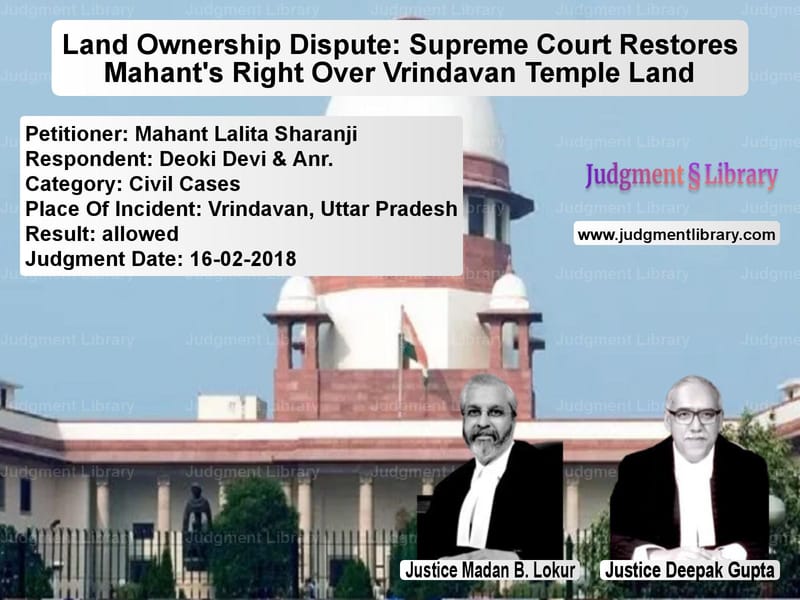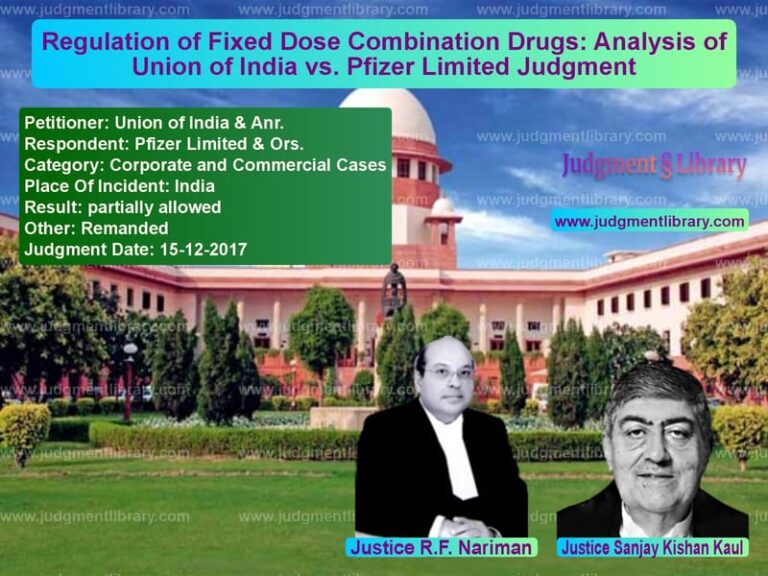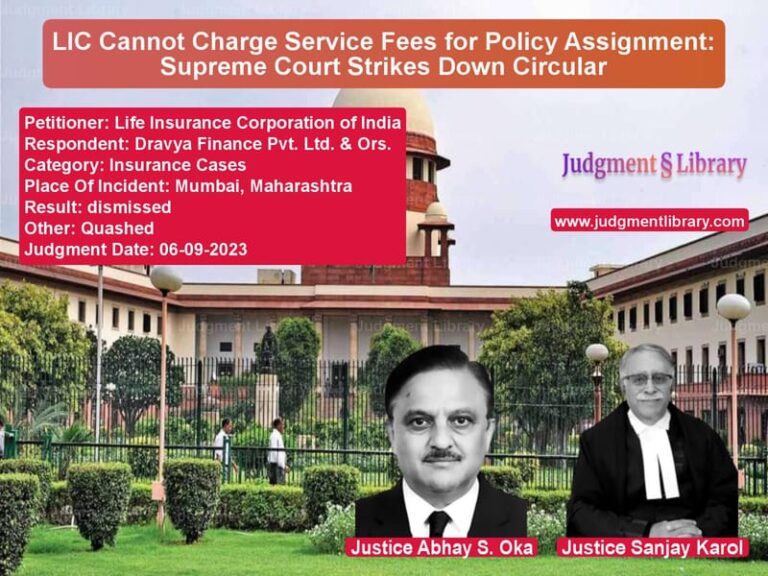Land Ownership Dispute: Supreme Court Restores Mahant’s Right Over Vrindavan Temple Land
The Supreme Court of India recently delivered a crucial judgment in Mahant Lalita Sharanji v. Deoki Devi & Anr., resolving a long-standing land dispute concerning the property of Shri Mukunddevacharya Peeth, Topi Kunj, Vrindavan. This case revolved around land consolidation and ownership rights in the historic temple town. The Supreme Court’s ruling reinstated the appellant’s rightful claim over the temple land while setting aside the decision of the Allahabad High Court.
Background of the Case
The appellant, Mahant Lalita Sharanji, is the head of Shri Mukunddevacharya Peeth, a religious institution in Vrindavan. The disputed land, Plot No. 212/2, measuring 2.48 acres, originally belonged to the temple. The contesting respondent, Deoki Devi, owned Plot No. 319, measuring 0.44 acres. Another individual, Bansi Ballabh, was the owner of Plot Nos. 215 and 216. This case arose due to changes made during consolidation proceedings under the U.P. Consolidation of Holdings Act, 1953.
During consolidation, portions of land were exchanged. The appellant was initially allotted a part of Plot No. 212/2, along with portions of Plot Nos. 215 and 216. Additionally, part of Plot No. 212/2 adjoining the Vrindavan Chatikara main road was designated as bachat land (reserved for village use). Another small portion of Plot No. 212/2 was allotted to one Premwati, who was not part of the case.
Key Dispute
- After consolidation, Bansi Ballabh challenged the allotment of 0.18 acres of Plot No. 215 to Deoki Devi.
- The Settlement Officer, Consolidation (SOC) allowed the appeal but went beyond the original dispute, altering the land distribution.
- As a result, Deoki Devi was moved from Plot No. 215 to 0.17 acres in Plot No. 212/2, which was initially part of the appellant’s land.
- The appellant’s land holding was also altered without his involvement in the appeal.
- The appellant, upon realizing the changes, challenged the order by filing a revision before the Deputy Director of Consolidation (DDC).
Legal Battle and Arguments
Petitioner (Mahant Lalita Sharanji)
The appellant argued that he was not a party to the appeal filed by Bansi Ballabh and was unaware of the changes made to his land holding. He contended that:
- His original land was unfairly transferred to another individual (Deoki Devi) without giving him an opportunity to contest.
- The designation of bachat land was accepted initially, but the subsequent order effectively deprived him of access to the road.
- The new allocation left him at a disadvantage, as the land originally reserved for village use (bachat land) was repurposed.
- As a religious institution, the land of the temple should not have been arbitrarily redistributed.
Respondent (Deoki Devi)
The respondent, Deoki Devi, contended that:
- The appellant had accepted the earlier consolidation order and could not challenge subsequent modifications.
- Under Sections 9(2) and 11-A of the U.P. Consolidation of Holdings Act, objections should have been raised at the appropriate stage.
- She had already constructed structures on the disputed land and could not be evicted.
Supreme Court’s Analysis
1. Violation of Natural Justice
The Supreme Court noted that the Settlement Officer, Consolidation had modified the appellant’s land holdings without notifying him. This was a clear violation of the principles of natural justice.
2. Fresh Cause of Action
The Court held that the appellant had a valid cause of action since the order fundamentally altered his land rights without his knowledge or consent.
3. Sections 9(2) and 11-A Not a Bar
The Court rejected the argument that the appellant was barred from challenging the changes due to procedural lapses. It observed:
“Each case has to be decided on its own facts. The appellant had not objected to the designation of a small portion as bachat land, but when the land was later transferred to a private party, he had every right to challenge it.”
4. Protection of Religious and Institutional Land
The Court emphasized that religious institutions and their land holdings should not be altered arbitrarily, as it affects their functioning and historical significance.
Supreme Court’s Verdict
The Supreme Court ruled in favor of Mahant Lalita Sharanji, restoring his ownership over the disputed portion of Plot No. 212/2. The key directives of the judgment were:
- The High Court’s decision was set aside, and the order of the Deputy Director, Consolidation was reinstated.
- The respondent, Deoki Devi, was directed to vacate the land and remove any construction at her own cost.
- If she failed to vacate within 30 days, the appellant could seek court assistance for eviction.
- In case of forced eviction, Deoki Devi would not be entitled to compensation for any structures built.
Implications of the Judgment
This ruling has significant implications for land consolidation and property rights, particularly concerning religious institutions:
- Protecting Religious Institutions: The Court reaffirmed that temple lands should not be subject to arbitrary redistribution.
- Ensuring Natural Justice: Any modification in landholding must follow due process, ensuring all affected parties are heard.
- Right to Challenge Illegal Orders: Even if an initial order is accepted, a fresh cause of action arises when substantial modifications occur later.
Conclusion
The Supreme Court’s judgment in Mahant Lalita Sharanji v. Deoki Devi underscores the importance of legal safeguards in land consolidation cases. The decision restores not only the temple’s property rights but also reinforces the principles of natural justice. It serves as a landmark ruling in protecting institutional land holdings from arbitrary administrative decisions.
Petitioner Name: Mahant Lalita SharanjiRespondent Name: Deoki Devi & Anr.Judgment By: Justice Madan B. Lokur, Justice Deepak GuptaJudgment Date: 16-02-2018
Don’t miss out on the full details! Download the complete judgment in PDF format below and gain valuable insights instantly!
Download Judgment: Mahant Lalita Sharan vs Deoki Devi & Anr. Supreme Court of India Judgment Dated 16-02-2018.pdf
Direct Downlaod Judgment: Direct downlaod this Judgment
See all petitions in Property Disputes
See all petitions in Landlord-Tenant Disputes
See all petitions in Damages and Compensation
See all petitions in Judgment by Madan B. Lokur
See all petitions in Judgment by Deepak Gupta
See all petitions in allowed
See all petitions in supreme court of India judgments February 2018
See all petitions in 2018 judgments
See all posts in Civil Cases Category
See all allowed petitions in Civil Cases Category
See all Dismissed petitions in Civil Cases Category
See all partially allowed petitions in Civil Cases Category







